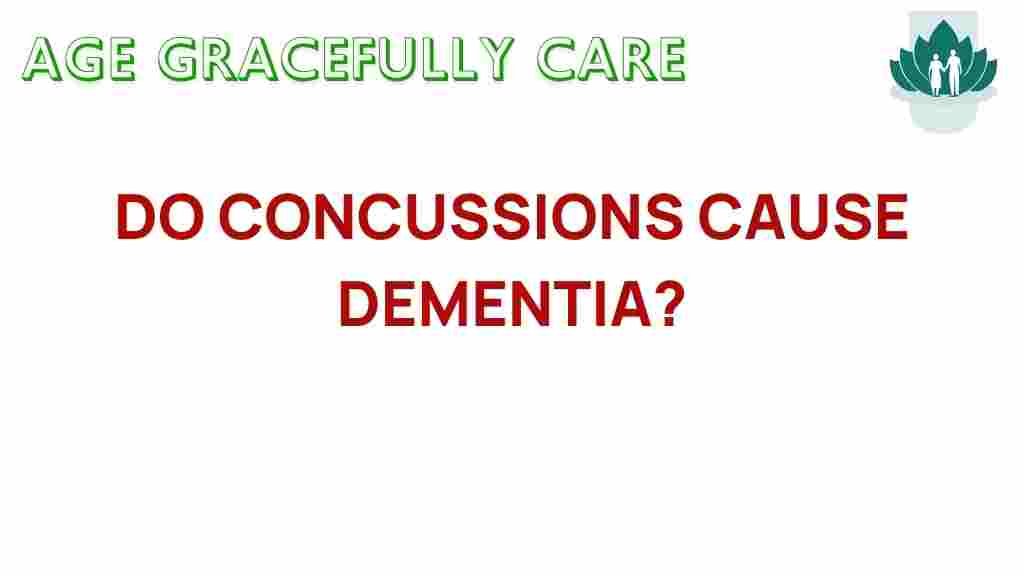Unraveling the Link: Do Concussions Lead to Dementia?
Concussions have become an increasingly hot topic, especially in the realm of sports and physical activities. As more athletes and individuals become aware of the potential long-term effects of brain injuries, questions arise about the relationship between concussions and serious conditions like dementia. This comprehensive exploration aims to shed light on the connection between concussions, dementia, and overall brain health, while also discussing neurodegeneration, cognitive decline, and the importance of mental health awareness.
Understanding Concussions
A concussion is a type of traumatic brain injury (TBI) that occurs when the brain is jolted or shaken within the skull. This can happen due to a blow to the head or a violent movement of the head and neck. Recognizing the symptoms of a concussion is crucial for timely treatment and recovery.
Common Symptoms of Concussions
- Headaches
- Confusion or feeling dazed
- Memory problems
- Nausea or vomiting
- Dizziness or balance issues
- Fatigue
- Changes in mood or behavior
It’s essential for anyone experiencing these symptoms, especially after an injury, to seek medical attention. Early diagnosis and appropriate management are vital for brain health.
The Connection Between Concussions and Dementia
Research has increasingly indicated a potential link between concussions and the development of dementia later in life. Dementia is not a single disease but rather a term that encompasses a range of symptoms affecting memory, thinking, and social abilities severely enough to interfere with daily life. It’s crucial to understand how concussions might contribute to neurodegeneration and cognitive decline.
Research Findings
Numerous studies have explored the relationship between head injuries and dementia. Some key findings include:
- Individuals with a history of multiple concussions may be at a higher risk of developing neurodegenerative diseases such as Alzheimer’s disease and Chronic Traumatic Encephalopathy (CTE).
- A study conducted by the National Institutes of Health found that athletes with repeated concussions showed significant cognitive decline compared to their non-injured peers.
- Research indicates that the cumulative effect of concussions can lead to chronic inflammation in the brain, which is a known factor in the development of dementia.
These findings underscore the importance of understanding how brain injuries impact mental health and cognitive development over time.
How Do Concussions Contribute to Neurodegeneration?
The path from a concussion to potential dementia involves several biological and neurological processes:
- Inflammation: After a concussion, the brain can become inflamed, which may lead to the degeneration of brain cells over time.
- Protein Accumulation: Repeated concussions can cause abnormal protein deposits in the brain, which are associated with neurodegenerative diseases.
- Disruption of Neural Pathways: Head injuries can disrupt communication between brain cells, impairing cognitive function and contributing to mental health issues.
Understanding these processes is crucial for raising awareness about the risks associated with concussions and their long-term effects on brain health.
Step-by-Step Process: Protecting Brain Health
Given the potential link between concussions and dementia, it is vital to prioritize brain health. Here’s a step-by-step process to help protect your brain from injury:
1. Awareness and Education
Educate yourself and others about the risks associated with concussions. Awareness is the first step in prevention.
2. Safety Measures
Implement safety measures in sports, such as:
- Wearing protective gear, like helmets.
- Following rules and regulations to minimize the risk of head injuries.
3. Early Recognition
Learn to recognize the signs of a concussion. Early detection can lead to better outcomes.
4. Seek Medical Attention
If a concussion is suspected, always seek medical evaluation and adhere to the recommended treatment plan.
5. Follow-Up Care
Regular follow-ups with healthcare providers can help monitor recovery and prevent long-term complications.
Troubleshooting Tips for Post-Concussion Care
After experiencing a concussion, taking care of your brain health is essential. Here are some troubleshooting tips:
Managing Symptoms
- Rest is crucial. Allow your brain time to heal by avoiding strenuous activities and cognitive overload.
- Stay hydrated and maintain a balanced diet rich in antioxidants to support brain recovery.
- Gradually reintroduce activities as advised by your healthcare provider.
Monitoring Changes
Keep track of any changes in your cognitive abilities, mood, or behavior. Report these changes to your healthcare provider.
Engaging in Rehabilitation
Consider engaging in tailored rehabilitation programs designed to improve cognitive function and manage symptoms. These programs may involve:
- Cognitive therapy
- Physical therapy
- Occupational therapy
Conclusion: The Importance of Awareness and Research
The connection between concussions and dementia is an area that requires ongoing research and awareness. As we continue to unravel the complexities of brain health, understanding how injuries affect cognitive function and mental health becomes increasingly important.
By promoting awareness and implementing preventive measures, we can protect our brains from the long-term effects of concussions. If you or someone you know has experienced a concussion, prioritize seeking medical advice and following a recovery plan to safeguard your brain health.
For more information about brain health, visit resources like the Alzheimer’s Association or consult with healthcare professionals who specialize in neurodegenerative diseases.
By fostering a culture of awareness, we can work towards minimizing the risks associated with concussions and improving mental health outcomes for future generations.
This article is in the category Health and created by AgeGracefullyCare Team
